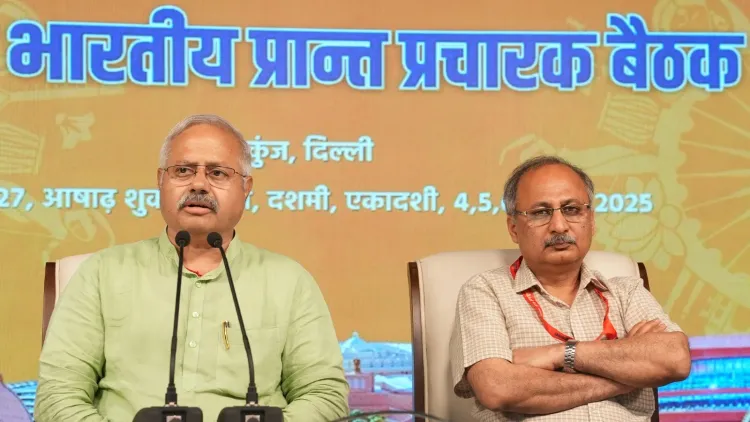What is RSS's stance on mother tongue education and Emergency-era Constitutional violations?

Synopsis
Key Takeaways
- RSS emphasizes mother tongue education.
- Active peace efforts in Manipur.
- Addressing constitutional violations during the Emergency.
- Panch Parivartan initiative focuses on inclusive growth.
- Strong grassroots engagement nationwide.
New Delhi, July 7 (NationPress) Senior functionaries of the Rashtriya Swayamsevak Sangh (RSS), Sunil Ambekar and Anil Agarwal, held a joint press conference on Monday, during which they extensively discussed the organization's initiatives in Manipur, its stance on constitutional values, language issues, and its roadmap for nationwide outreach and social transformation ahead of its centenary year.
Regarding the ongoing ethnic strife in Manipur, Ambekar remarked that RSS volunteers are actively engaged in ground efforts to foster peace and build communication channels between the Meitei and other affected communities.
"Our karyakartas are continuously involved in efforts to restore stability and promote dialogue among the populace. Although we see progress, achieving full normalcy will require time," he stated.
The RSS leadership highlighted that inclusive outreach initiatives are being implemented to connect with diverse social and regional demographics. They noted that participation from border and remote communities has been enthusiastic, reflecting a rising level of public trust and a stronger grassroots presence.
Addressing contentious issues surrounding socialism and secularism in the Constitution, the RSS recalled the Emergency period as a time of significant constitutional compromise.
Ambekar stated, "This was a period when democratic principles were virtually suspended, with constitutional amendments made without public consent. The younger generation must understand how easily democracy can be compromised without proper checks on authority."
On the matter of language, Ambekar articulated that the RSS regards all Indian languages as national and deserving of equal esteem.
"We advocate for communication in the language that is commonly spoken in local areas, with the belief that children should commence their education in their mother tongue or regional dialect," he explained.
In response to past criticisms and attempts to ban the RSS, the leaders emphasized that such efforts were neither embraced by the public nor upheld by legal standards.
"Whenever there were attempts to impose a ban, there was either legal intervention or considerable public pushback, as these efforts lacked credibility and legitimacy," the leaders remarked.
The RSS is advancing its "Panch Parivartan" initiative—a five-point agenda focused on economic self-sufficiency, holistic personal growth, value-based living, enhanced social welfare, and inclusive development. This framework, they mentioned, will steer the organization's mission leading up to its centenary year.
One of the primary areas of focus will be broadening intellectual engagement. The Sangh intends to conduct district-level discussions with scholars, thinkers, and public figures across all 924 Sangh-organized districts to facilitate deeper ideological exchanges.
As part of its mass contact campaign, the RSS plans to host over one lakh Hindu Sammelans across 58,000 mandals and 44,000 bastis nationwide, aiming to strengthen grassroots connections and foster cultural unity.
Ambekar also provided insights into the organization's training endeavors, revealing that more than 100 Sangh Prashikshan Vargs were conducted last summer.
Of these, 75 camps targeted volunteers under 40, engaging a total of 17,609 participants, including those trained at the Nagpur headquarters.
Additionally, 8,813 students took part in Sangh Shiksha Vargs, and 4,270 individuals aged 40 to 60 received training, highlighting the Sangh's escalating involvement across age groups.









